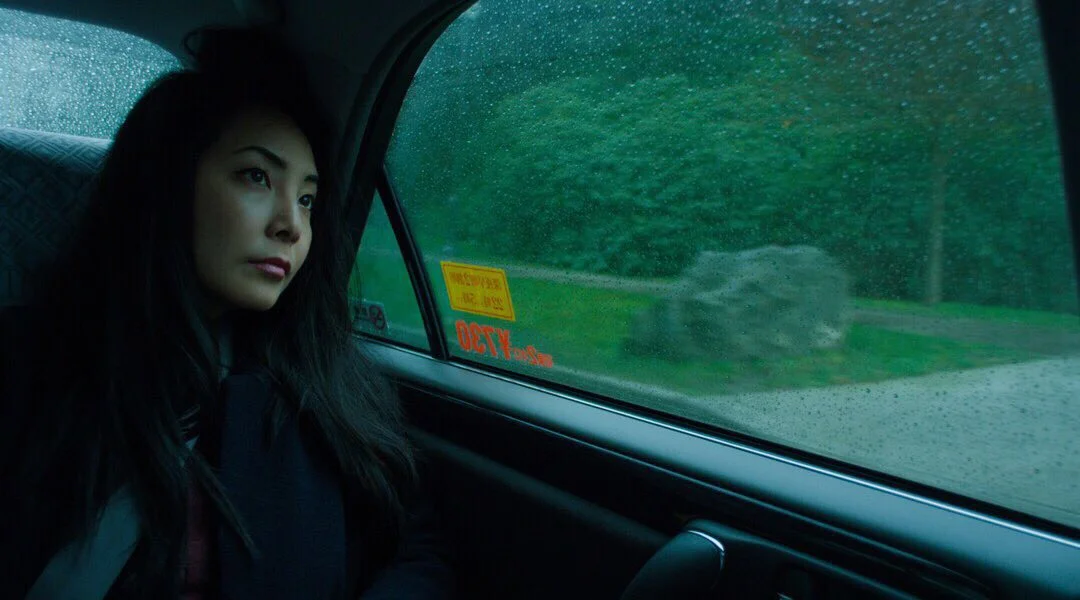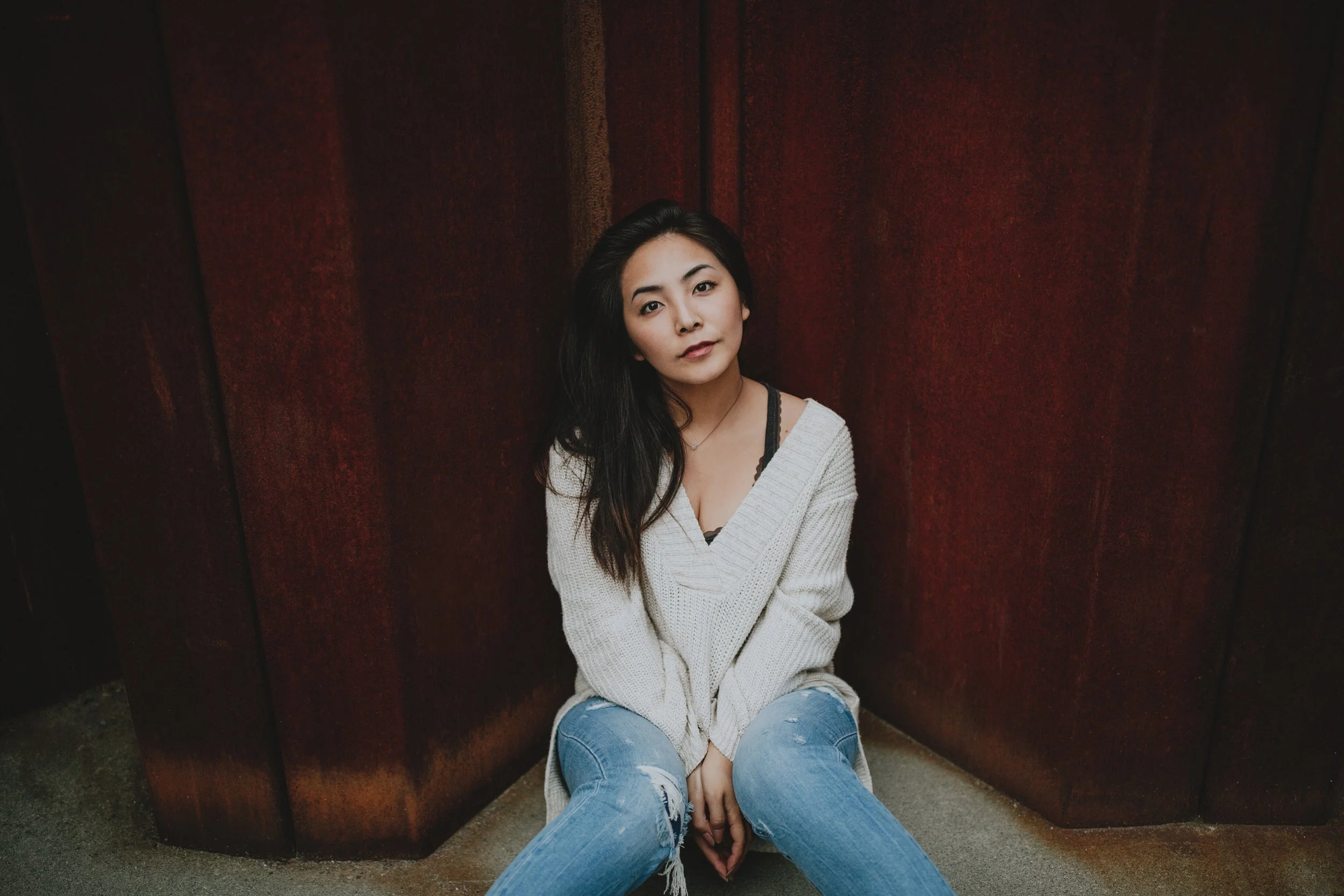In the middle with Mayumi Yoshida
Mayumi Yoshida is used to living in the in-between.
“I’ve always felt like I’ve never had a home, even though I’m Japanese, and I’ve lived in Belgium, and the States,” says the Vancouver-based multi-hyphenate (director-actress-writer-producer) in a recent interview. She’s lived her life, she says, mostly in the space between Asian and North American cultures: relating to and participating in both; keenly aware of the gulfs and overlaps between them.
Mayumi Yoshida in a still from Akashi.
It’s an awareness that has fed her screen work, beginning with Akashi, the Storyhive-funded short film she wrote, directed, and starred in that earned her the Matrix Award at the 2018 Vancouver International Women in Film Festival, the award for Best Female Director at the 2018 Vancouver Short Film Festival, and the Outstanding Writer Award at the NBCUniversal Short Film Festival.
"I'm in the middle," she says. “I’m always somehow stuck in between, and a lot of the characters I write are stuck in that middle, and not sure where to go, and not sure which is right or wrong."
Yoshida is leveraging her position in the middle to not only tell her own stories, but to compel others – especially traditionally marginalized voices – to do the same. This is most evident in her new role as creative producer (with Nach Dudsdeemaytha, her frequent collaborator and co-founder of This Is A Spoon Productions) of the 13th Annual Mighty Asian Moviemaking Marathon, a high-energy filmmaking competition that runs from now until the middle of July.
(MAMM 2018 kicks off in earnest on June 16 with a full day of Diversity in Filmmaking panels featuring industry leaders and professionals; your YVR Screen Scene editor-in-chief will appear on a panel entitled Shaping the Conversation, which will examine the importance of representation on screen. Yoshida and Dudsdeemaytha will moderate. Full details at https://www.facebook.com/events/390780061399931/)
Yoshida is also adapting Akashi into a feature film, collaborating on a web series that prominently features Asian women, directing for the stage, and is in post-production on a short she shot in Japan – oh, and she recently signed with the prestigious Gersh Agency in Beverly Hills, and took meetings with boldfaced studios like 20th Century Fox, Shondaland, HBO, Lionsgate, NBC, and Marvel TV.
Mayumi Yoshida. Photo by Danaea Li.
To understand how Yoshida arrived at this moment in her life and career, we’ve got to rewind to the weeks leading up to Storyhive’s 2016 Digital Shorts edition. Yoshida was preparing for the premiere of her 75-minute play, Akashi, at the 2016 Fringe Festival.
“They were exclusively looking for female directors for submissions, and I was tagged in a lot of these posts on Facebook, probably because I had directed a play before and they knew I was writing and directing a play that was coming up,” she recalls.
At the time, Yoshida had never before directed a film, but she’d been working on the second season of The Man in the High Castle, both in an acting role (as the Crown Princess of Japan, a role for which she was nominated for a UBCP/ACTRA Award in 2016) and as dialect coach. “I was there every single episode, right by the monitor and the director and the producers, so while it wasn’t an intense shadowing experience, I felt like I was almost shadowing these directors every episode, because I could hear their conversations,” she says. “It was really interesting, and I thought, ‘Maybe it might be fun to try out.’”
Mayumi Yoshida. Photo by Kristine Cofsky
And so Yoshida submitted a pitch for a short film version of Akashi to the Storyhive competition. Not only was it ultimately funded, it took home the BC Grand Prize and led to a sponsored trip for Yoshida to the Banff World Media Festival.
Akashi is inspired by a conversation that took place between Yoshida and her late grandmother nearly seven years ago (during Yoshida’s first trip back to Japan after she’d moved to Vancouver), in which her grandmother revealed that her grandfather had had a longtime lover, and that the lover had attended his funeral.
In the film, Yoshida portrays a recently arrived Vancouverite – currently in the midst of a relationship dilemma – en route to her grandmother’s funeral in Japan; celebrated mime artist Yayoi Hirano appears as the grandmother; acclaimed actor and playwright Hiro Kanagawa (Altered Carbon) plays a cabbie who drives Yoshida’s character to the funeral (“He’s one of the few Japanese Canadian actors who can speak Japanese fluently, and he brings such warmth to anything he does”); and pioneering taiko drummer Linda Uyehara Hoffman portrays the grandfather’s lover.
Yoshida describes being deeply impacted by her conversation she’d had with her grandmother, notably the revelation that “she’d had very few choices relationship-wise, especially with the circumstance she was in, which was right after World War 2 and it was very much about, financially, how can we survive,” she says. “It wasn’t so much about love. There were many couples that did love each other and got married in that time, too, but in grandmother’s case, it wasn’t. They were committed in that limitation that they had.”
On the surface, Yoshida's grandmother's situation stands in stark contrast to the reality faced by most Millennials. “In our generation, especially living in Vancouver, it’s not a city where you’re forced to marry someone,” says Yoshida. “You have choices. Even with careers, you have all of these options, and because you have all of the freedom to make these choices, we almost limit ourselves even more, because we don’t want to get hurt or we’re scared to try these things. It’s different limitations [than what my grandmother faced]. I thought that contrast was really interesting.”
Yoshida appreciates the bounty of awards she’s won for Akashi, and not just because they validate her own creative journey: she values how the awards she's won could inspire other emerging Asian Canadian filmmakers to pursue their own projects and dream beyond perceived limitations.
“Coming from Japan and speaking as someone in the Asian Canadian community, when it comes to awards, I think we still feel marginalized,” says Yoshida. “We still feel like maybe it’s not our place. Hopefully [the awards I’ve won] make everybody feel like, yes, everybody is considered, and everybody has the right to possibly win these awards. Hopefully that invisible shield will shatter because they’ll see, ‘Oh, Mayumi won this, and if Mayumi won this, if a Japanese person won this, maybe I’ll have a chance, and maybe it’s worth trying.’”
“If you see someone who looks like you make a speech or receive an award, you might feel like, ‘I had no idea this was possible,’” she adds. “It’s a scary thought that we have without even noticing. I do that. I’ve done that all my life. I’m really grateful that these awards will make other people feel, ‘It’s worth it, and I’m going to try for it.’”
Follow Mayumi Yoshida on Twitter @immyyoume.









